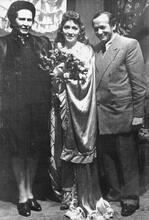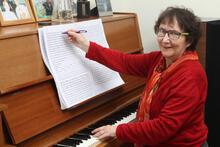Michal Smoira-Cohn
Israeli musicologist Michal Smoira-Cohn, 5 November 2006
Photo by Elan J. Tal. From Wikimedia Commons.
After graduating from the Palestine Academy of Music in 1947, Michal Smoira-Cohn worked as a teacher, editor, and musical director for nearly 50 years, establishing herself as one of Israel’s best-known musicologists. Her expertise led to her involvement in innumerable musical features and events. Between 1970 and 1980 she headed the panel of judges in the international Arthur Rubinstein piano competition and from 1974 to 1980 she was among the directors of the Israeli music center of UNESCO. After her retirement, she published not only an autobiography but also a major book on contemporary music, both in Hebrew. She continued to be a leading figure in Israel’s cultural life in general and its musical activities in particular until her death in 2015.
Background
One of Israel’s best-known musicologists, Michal Smoira-Cohn was born in Tel Aviv on February 13, 1926. Her father, Moshe Smoira, who was born in Königsberg, Germany, in 1888, attained a doctorate in law and Semitic languages at Heidelberg University. His father, Eliezer Smoira, was a fish merchant. Michal’s mother, Emma (Esther) Hurwitz, was born in Mir, Russia in 1889. Esther’s father, Michael (after whom Michal was named), who owned forests in the region of Minsk, was an active Zionist and served as a delegate to the Zionist Congresses from 1898 (the Second Congress) until his death in 1925. Esther grew up in Minsk but at the age of sixteen was sent to a boarding school for girls in Frankfurt am Main, because she had participated in the Revolutionary activities of 1905 and her father feared she might be arrested. She completed her schooling at a gymnasium in Königsberg, where her parents had meanwhile moved and where she met Moshe Smoira. They married in 1914 and immigrated to The Land of IsraelErez Israel in 1922.
In 1948 Moshe Smoira was appointed the first president of the Supreme Court (the Israeli equivalent of chief justice). He held this post until 1954 and died in 1961. Esther was active in women’s organizations, founding WIZO in Palestine and becoming its first president. In addition to Michal, the couple had another daughter, Ada Meirav, born in 1932.
Education and Career
Michal Smoira studied at the Devora Kalen primary school and in 1942 completed her studies at the Hebrew University High School in Jerusalem. She graduated from the Palestine Academy of Music in 1947. After teaching piano and music theory at the Jerusalem Conservatory from 1948 to 1953 she became the editor of Bat-Kol, a music magazine published by the Tur publishing house, while also serving as director of the Haifa Orchestra from 1954 until 1956. She then went to Sweden for advanced studies at the Higher Academy of Music of the University of Uppsala (1956–1958). Upon her return to Israel she served simultaneously in several capacities: as editor of Bat-Kol, which was now a bi-monthly published by the Association of Composers (1959–1962), as coordinator of music studies at the Thelma Yellin High School for the Arts in Tel Aviv (1959–1965) and as a lecturer in the history and the theory of music at the Tel Aviv Music Academy (1959–1966). From 1960 to 1964 she taught philosophy of music at the college for music teachers in Tel Aviv and from 1963 to 1966 she served as pedagogical coordinator at the Tel Aviv Music Academy. She was the music critic of the daily Haaretz from 1963 to 1967 and lectured in the musicology department of Tel Aviv University from 1966 to 1967. Her last teaching post was at the Rubin Academy in Jerusalem, where she lectured on philosophy of music from 1970 to 1995.
An outstandingly articulate broadcaster, Michal Smoira headed the music division of Kol Yisrael from 1968 to 1991 and delivered numerous talks, the most remarkable of which were five series created between 1974 and 1986. These comprised a series of talks entitled “Music has many faces” (1974); fifteen talks on “Music has many answers” (1975); “Thoughts about music,” eighteen weekly talks delivered in 1976; “A Musical Dictionary: Definitions of terms and concepts ‘in a word,’” over three hundred five-minute talks broadcast in 1985 and 1986; and five interviews with broadcaster Ricka Bar-Sela on “The Status of Music in Culture.” Since her retirement she has published not only an autobiography, Personal Repertory (1997), but also a major book on contemporary music, entitled Message and Mission (2005), both in Hebrew.
Like her mother, Michal Smoira was active in WIZO, chairing Young WIZO from 1947 to 1951 and presiding over the Jerusalem branch from 1972 to 1978. As its representative, she headed the Council for Women’s Organizations from 1978 to 1979 and again from 1985 to 1988. Devoutly dedicated to the principles of democracy and justice, she founded Sovlanut (Tolerance) in 1982, chairing it for ten years and devising a number of projects designed to inculcate these principles in the Israeli population in general through various educational and public activities. In 2004 this work won her the Teddy Kollek Prize awarded by the Jerusalem Foundation. As a member of the Shinui party she served on its secretariat from 1993 to 1996, at the same time representing the party in the Jerusalem Municipal Council. She was also named an honorary citizen of Jerusalem in 1998. In 1999 she was made an honorary fellow of the Rubin Academy of Music and Dance in Jerusalem, which she had headed from 1979 to 1985, and in 2001 she was awarded an honorary doctorate by the Jewish Theological Seminary of New York. Her contribution to music in Israel was recognized by the Ministry of Education and Culture.
Michal Smoira married her first husband, the violinist Eli Goren, in 1947; they were divorced in 1949. In 1950 she married violinist Gideon Roehr and in 1951 gave birth to a daughter Tamar, who is now a bible scholar. This marriage ended in 1957. In 1958 she married Yitzhak Roll, a designer of exhibitions and fairs who was in charge of Israel’s tenth anniversary exhibition and who died in 1963. Their son Gadi, born in 1959, is a theater director. In 1966 she married Haim Cohn (1911–2002), who was deputy president of the Supreme Court from March 1980 until his retirement in 1981.
Smoira-Cohn’s expertise led to her involvement in innumerable musical features and events. Between 1970 and 1980 she headed the panel of judges in the international Arthur Rubinstein piano competition and from 1974 to 1980 she was among the directors of the Israeli music center of UNESCO. She continued to be a leading figure in Israel’s cultural life in general and its musical activities in particular.
Michal Smoira-Cohn passed away on January 19, 2015, in Tel Aviv





